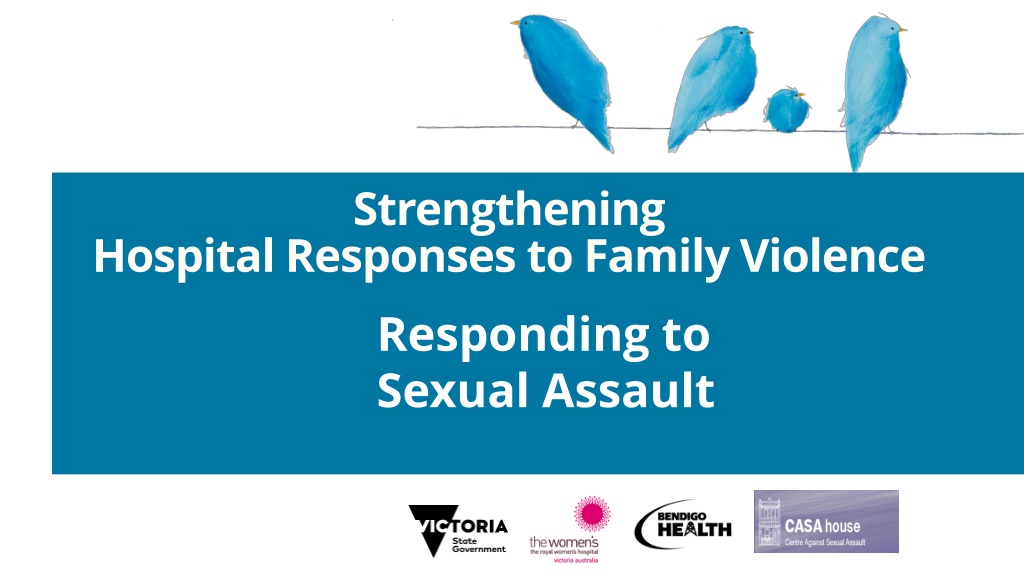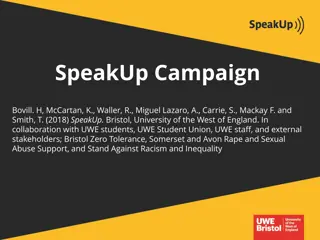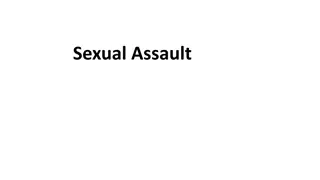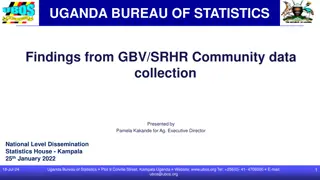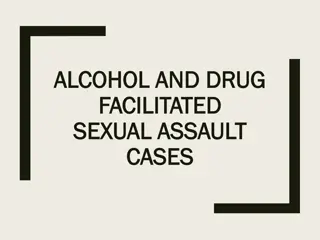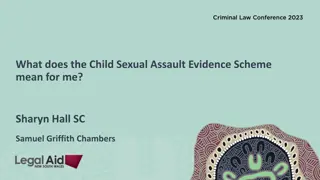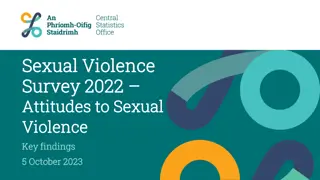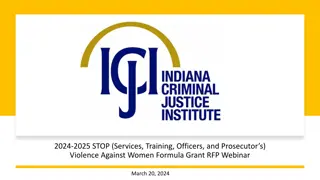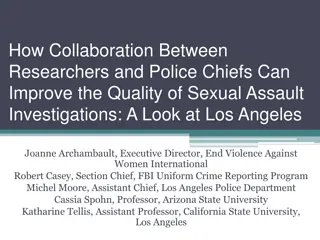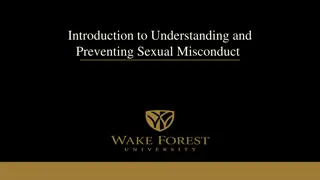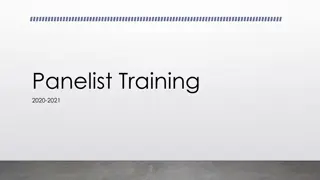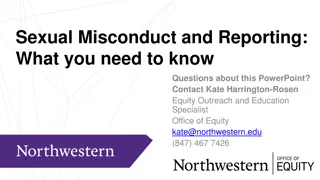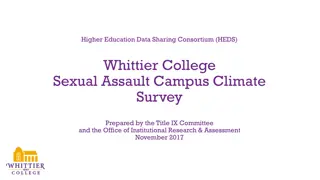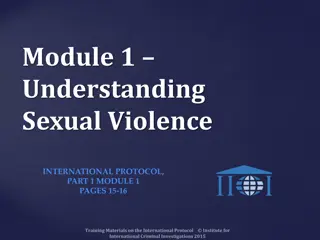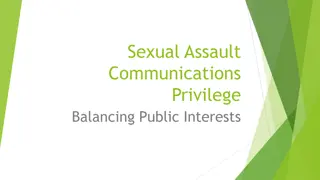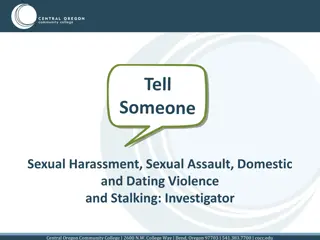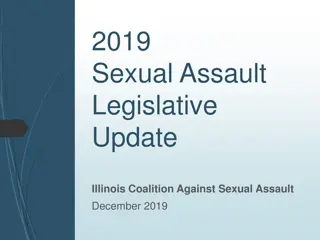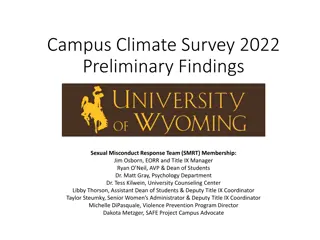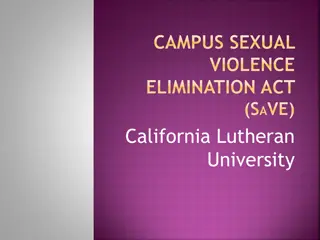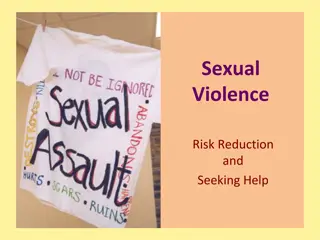Strengthening Hospital Responses to Family Violence and Sexual Assault
This content covers crucial information on sexual assault, consent, prevalence, and legal aspects in Victoria, Australia. It highlights definitions, learning objectives, and ways to respond to disclosures of sexual violence, along with the importance of consent and understanding the law's restrictions on sexual behaviors involving children and young people.
Download Presentation

Please find below an Image/Link to download the presentation.
The content on the website is provided AS IS for your information and personal use only. It may not be sold, licensed, or shared on other websites without obtaining consent from the author. Download presentation by click this link. If you encounter any issues during the download, it is possible that the publisher has removed the file from their server.
E N D
Presentation Transcript
Strengthening Hospital Responses to Family Violence Responding to Sexual Assault
Specialist Family Violence Services 1800 806 292 1800 737 732 1800 015 188 1800 105 303 1800 755 988 2 LGBTIQ 1800 542 847 1300 766 491
LEARNING OBJECTIVES Definition of sexual assault Consent Prevalence and facts about sexual assault Responding to disclosures of sexual violence rights, options and control Healing and recovery Support and referral options
Any unwanted sexual behaviour that makes people feel uncomfortable, frightened or threatened (CASA) Any sexual activity that is not freely agreed to Family violence often incorporates sexual assault What is Sexual Assault? The LEGAL definition of sexual assault in Victoria includes rape, incest, child abuse, and unwanted sexual behaviour, for example, unwanted kissing and touching. It also includes behaviour that does not involve actual touching. For example, forcing someone to watch pornography or masturbation is also sexual assault (Victorian Legal Aid website).
Submit because of force or the fear of force or harm of any type A person cannot consent when they Submit because they are unlawfully detained Are asleep, unconscious, or significantly affected by alcohol or other drugs Don t understand the sexual nature of the act Are mistaken about the sexual nature of the act or the identity of the person Mistakenly believe that the act is for medical or hygienic purposes
The law sets restrictions around having sex, sexual touching or performing sexual acts in front of children and young people, even if the child or young person agrees. Legal age of consent for children and young people Under 12 years old: No-one can engage in sexual behaviours with a child 12 to 15 years old: Must be within 2 calendar years in age 16 to 17 years old: Must not be caring for or supervising the young person, e.g. a teacher, youth worker or foster carer
Prevalence of sexual assault
Impacts of sexual assault Emotional and psychological: PTSD, nightmares, depression, self harm Social, intimate and family relationships: lack of trust, parenting issues Physical health: genital injuries, gynaecological disorders, pregnancy Legal: criminal activity, mistrust of police Housing: homelessness, concerns about safety Financial: lack of financial control, inability to manage finances Education and employment: inability to sustain work or study
Sexual assault is often undisclosed and under reported due to: society s attitudes to sexual assault: blame victims and excuse perpetrators Barriers to disclosure shame and internalised beliefs: nobody will believe me , I must be crazy , it s my fault offender behaviour: threats, bribes or promises
Events that may trigger reminders or disclosures of past sexual assault Health issues, medical appointments Pregnancy/childbirth / breastfeeding Traumatic events (e.g. car accidents) Natural disasters (e.g. bushfires) Media reports relating to sexual assault Relationship dynamics that are a reminder of having no control
Selma is a 23 year old woman, 32 weeks pregnant with her first child Attending ante natal clinic appointment at her local maternity hospital. Case Study Missed several appointments and tests including her 20 week scan and the Glucose Tolerance Test (GTT). In her appointment with the midwife the need for an ultrasound is discussed and Selma immediately becomes distressed and starts crying Selma is not making direct eye contact and saying that she is over reacting just tired but mentions that she is having nightmares and feels like she isn t in control of her body Selma also discussed feeling scared about the pain of childbirth
Rights Options Control Respecting decisions and choices Sensitive inquiry and effective support Universal sensitive practice Listening Believing Taking disclosures seriously Initiating a conversation
A key element of the experience of sexual assault is loss of control and feelings of powerlessness Sensitive practice: Aims to make people feel safe, respected and in control Sensitive Practice ensure health needs are met, inclusive of safety respects a person s dignity and intrinsic sense of empowerment supports autonomy and active decision making acknowledges unique experiences and support needs can be a catalyst for action
Inquire sensitively Ask about safety and effects of abuse, not details of abuse You don t need to tell me details of what happened I d like to talk about how it s affecting you and what might help you now in the pregnancy and labour/in addressing your health issues now. Are you comfortable with that?
Respond respectfully Listen actively and believe Validate and normalise responses to sexual assault I believe you Thankyou for telling me Be aware of non-verbal cues It makes sense that you would feel like that That sounds understandable given what you have been though Place blame with perpetrator not person experiencing abuse Help people identify & express their needs & concerns and provide options It s not your fault, they/he should not have done that You should not have had to experience that You have a right to a respectful and safe relationship Is there anything that you need now or are concerned about? Would you like to speak with someone about what happened to you?
Asking about safety Is anything like that still going on? Do you feel safe now? Will you be safe when you leave here? Is anyone treating you or other people around you like that now?
What deters you from having a conversation about sexual assault? Ask yourself
Mandatory reporting Health professionals have a legal responsibility to report disclosed or suspected child abuse. It is important to know your hospital s policies around duty of care and mandatory reporting
Referral Social work department Centre Against Sexual Assault (CASA) 24/7 crisis care response Free and confidential support and advice to adult victim/survivors of past and 7 out of 10 recent sexual assault Telephone support and advice to friends and family Advice, secondary consultation and debriefing to other professionals 2 out of 10 SUFFER FROM MENTAL ILLNESS For children and young people Police Child protection CASA Gatehouse at the Children s Victorian Forensic Paediatric Medical Service (VFPMS) GET PROPER TREATMENT
Professional Manager or supervisor Family violence workplace contact via the Workplace Support Program Clinical champions Employee Assistance Program Centre Against Sexual Assault - 24/7 counselling for professionals 1800 RESPECT - 24/7 counselling for professionals Staff resources: Support for you Self-care Any activity that we do deliberately in order to take care of our mental, emotional and physical health and can include; Talking with someone you trust Taking regular breaks and annual leave Healthy eating and exercise Debriefing (formal and informal) Work-life balance and keeping work and your personal life separate Prioritise activities you find enjoyable outside of work
Family violence often incorporates sexual assault Many people have experienced sexual abuse, sexual assault and violence in their lives This could be a factor in their hospital presentation If you notice the signs, respond sensitively Remember people are experts in their wellbeing and safety Remember people have choices their body and their health You don t have to fix the problem always consult if you are unsure CASA is an excellent resource for staff and patients Key messages
Reflections 1. What stood out to you from this session today? 2. What could you do in your work to support people to feel safer, comfortable and in control? 3. Who might you access for support, or to talk with, after this session?
References Australian Institute of Health and Welfare 2018. Family, domestic and sexual violence in Australia 2018. Cat. no. FDV 2. Canberra: AIHW. Family Violence Protection Act 2008 (Vic), Sourced from http://www.austlii.edu.au/au/legis/vic/consol_act/fvpa2008283/ Our Watch. & Australia s national Research Organisations for Women s Safety. (2014). Violence against Women: Key Statistics. Sourced from https://d2c0ikyv46o3b1.cloudfront.net/anrows.org.au/s3fs-public/Key%20statistics%20%20all.pdf Royal Commission into Family Violence (RCFV), 2016, Royal Commission into Family Violence: Summary and recommendations Paper No 132, p. 2014-2016. Victorian Legal Aid: Sourced from https://www.legalaid.vic.gov.au/find-legal-answers/sex-and-law/sexual-assault Australian Institute of Family Studies: https://aifs.gov.au/publications/sexual-violence-and-gay-lesbian-bisexual-trans-intersex-and-queer- community The Royal Australian College of General Practitioners Sourced from: http://www.racgp.org.au/your-practice/guidelines/whitebook/chapter-9- sexual-assault/#3 World Health Organisation Sourced from: http://apps.who.int/iris/bitstream/10665/136101/1/WHO_RHR_14.26_eng.pdf WHO p.16
